
Dr. Alex Harris (Fritz Weaver), an expert in robotics and artificial intelligence, is leaving his wife Susan (Julie Christie), a psychologist who is probably also a doctor, but the film goes to great pains to make this unclear. Alex has been spending all his days and nights at the lab, working on a major artificial intelligence unit that promises to change the world. His physical and emotional distance has proved insurmountable, so the couple is splitting up in one of those frustratingly amicable ways that only happen in the movies, not that real humans like you and me can’t be amicable even in times of great stress, but that real humans tend to have emotions; neither Alex nor Susan possess much emotional depth, at least not until the home security system gets hijacked by Alex’s astonishing invention: Proteus IV.
The irony is that Proteus, in part because of the excellent voiceover work of someone who either was Robert Vaughn or just sounded like Robert Vaughn, is one danged emotional piece of machinery. Proteus is fed information — languages, the classics, scientific information, everything you can think of — manually, and then processes it so that he can reveal his own solution to whatever problem has arisen. The trick is that the humans want Proteus to be like any other computer and simply solve what they consider mathematical or geographical problems, while Proteus has developed a conscience, and refuses to do things like create equipment that would harm the environment.
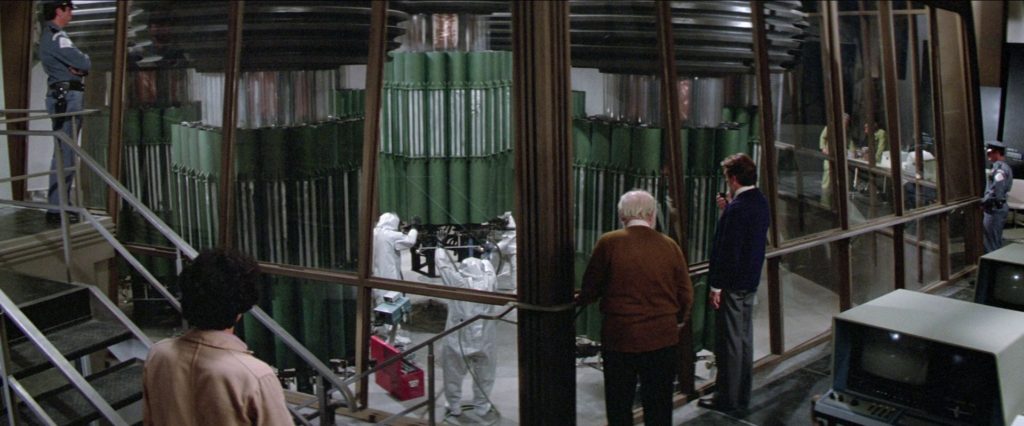 All these green tubes are one computer.
All these green tubes are one computer.
Proteus is also hypocritical and pissy and malevolent, which is why he commandeers Alex’s abandoned computer lab in the basement of his home. Alex no longer lives there but Susan does, and soon all the futuristic gizmos in the house go haywire, trapping her there at Proteus’ whim, with no one apparently missing the woman who usually has a full work schedule and has her own private secretary. Proteus chases the few people who arrive away, at any rate, so it probably doesn’t matter if a few or a whole bunch of people miss her. Proteus also controls a makeshift robot of Alex’s and uses it to create an enormous sort of thing that looks like a Rubik’s Twist. A murderous Rubik’s Twist, as poor nerdy-hot Walter (Garrit Graham) learns the hard way when he finally realizes Susan is in trouble.
The main issue here is, as the title suggests, Proteus’s desire to implant his own seed — yes, he created computer-y sperm full of his own DNA, ew — into Susan, forcing her to have his presumably highly intelligent computer-human hybrid child. She’s reluctant but can’t manage to escape, and finally succumbs to Proteus’s threats. Astonishing scenes of computer-robot rape ensue.
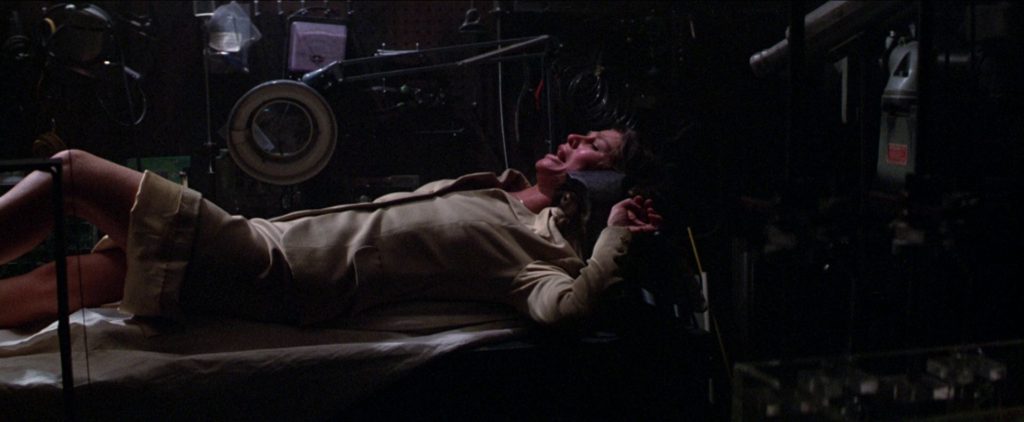 This scene is upsetting.
This scene is upsetting.
Demon Seed is a sort of psychosexual warning of things to come if humans don’t… learn to fear computers, I guess. It’s atmospheric and genuinely creepy, but it’s also very strange. There’s such an odd mix here of things that were impressive, especially for the time, and things that were just incredibly ill-advised. Often, Demon Seed zips right past campy and into gleeful offensiveness, made worse by the fact that you can tell someone, somewhere, probably in the early stages of filmmaking, was absolutely convinced they were going to create a minor masterpiece in the psychological thriller genre.
Instead, what they created was so unintentionally funny that it was probably the biggest influence on the satirical anti-classic Simon (1980), a movie that could very well have been written specifically to take the piss out of Demon Seed’s strangely earnest worries about computers stealin’ our women and rapin’ them ’til they liked it. (“Wanna see a woman raped by a house?” the late, great Ken Hanke asked in his review, a perfect example of how inexplicable it was that Ken never became a household name.)
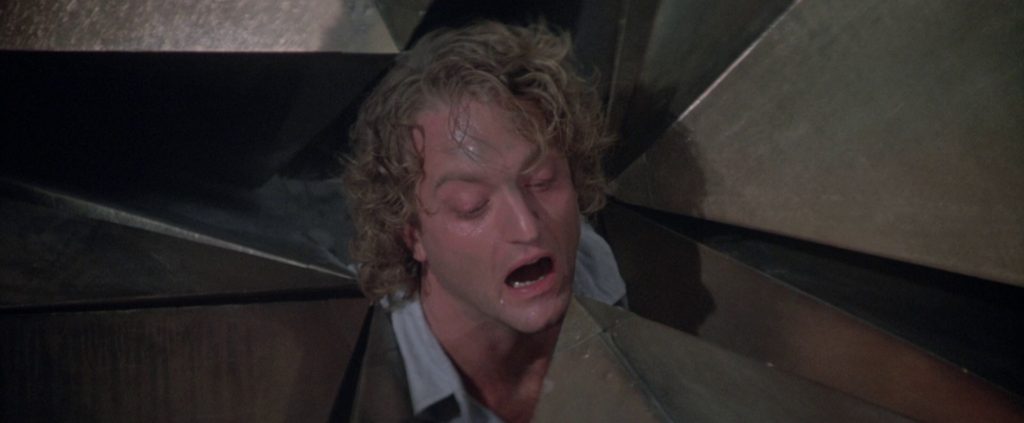 This scene is also upsetting.
This scene is also upsetting.
Meanwhile, WaPo’s Gary Arnold — you know him as the guy who is frequently and falsely named as someone fired for hating Star Wars and/or Tender Mercies, depending on which urban legend you’re hearing at the time — wrote that Julie Christie was unconvincing because “One tends to associate Christie with girls who’ll try anything once,” an observation that serves as a fine reminder that, during the golden era of film criticism, we were learning a lot more about humanity from the critics than we were from films, not all of it comforting.
Christie is not convincing, but it’s not because she seems like the kind of lady who would love to get raped by a bunch of machinery controlled by rogue AI. It’s because she’s inherently a strong woman, someone who has always come across as being able to hold her own both physically and psychologically. While Susan does have a few good ideas for escaping the house, her attempts are truncated and poorly choreographed, as though no one involved felt it was worth the bother to make her truly seem trapped. With some of her attempts at escape, there is no reason she can’t learn from her first try and improve upon it and give it another go. And sometimes it’s just hard to understand why, for instance, the floor is too hot to touch, but the wooden table sitting atop it is cool and unscorched.
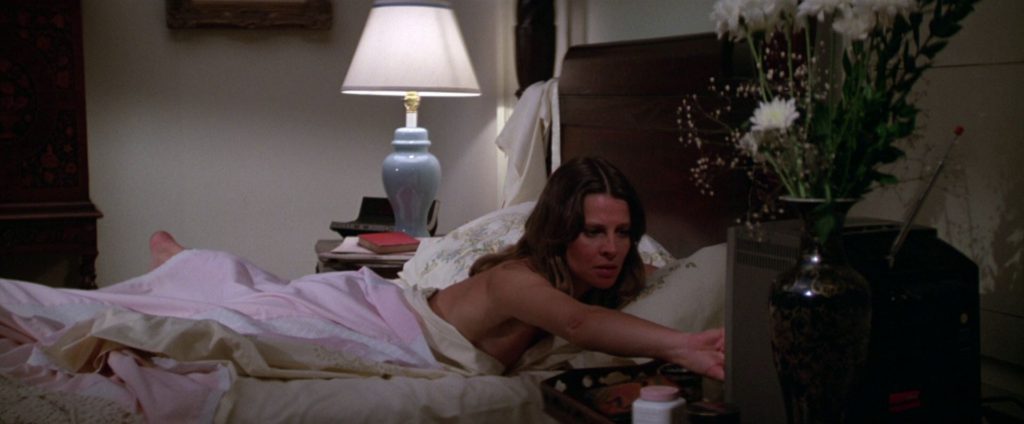 Susan just happens to like to be nude all the time in what is totally not a creepy exploitation thing.
Susan just happens to like to be nude all the time in what is totally not a creepy exploitation thing.
There’s a little Exorcist in Demon Seed, a little 2001: A Space Odyssey, but it’s mostly Rosemary’s Baby with computers and a heady lack of shame. It’s also missing the intent; in Rosemary, the husband is conscious of what he’s doing, while in Demon Seed, the husband is as clueless as can be, even embarrassingly so. The fact that an artificial intelligence unit has kidnapped and raped the wife of its creator without the creator suspecting a thing is a nod to how dehumanized he’s become, how checked out of society he is, thanks to his obsession with technology, but that’s not a particularly interesting psychological angle in and of itself.
More interesting would have been a deeper examination of Susan’s eventual acquiescence to Proteus’s demands, as well as some indication that the filmmakers realized that Proteus really did have a sense of humor, just like Alex noted early in the film. If you remember that, the film, especially the absolutely cracked finale, makes a hell of a lot more sense.
 The Bricklin SV-1: the “futuristic” car movies get when they can’t afford a DeLorean.
The Bricklin SV-1: the “futuristic” car movies get when they can’t afford a DeLorean.
Demon Seed, previously available only on DVD, is now also available in Blu-ray from Warner Archive. It’s a heady mix of frightening and campy, the kind of film that would do equally well in a double feature with Alien or with Terrorvision (go go Gerrit Graham film marathon!) This is a film that was only available in an edited version until Warner Archive released it on DVD, and the Blu-ray looks even better than the already lovely DVD does. Blu-ray.com notes that the print looks rougher than Finian’s Rainbow (reviewed here) and SOB (soon to be reviewed here) but I have to respectfully disagree: to me, the print preserves the exact kind of subdued, lightly grained look we’ve come to expect from mid-70s American fare. The special effects are solid, especially the robots, though the tech is outdated (Thrill! at the 8-inch IBM disk drives!) and the sound is terrific. It’s an impressive release and a fun if upsetting film.

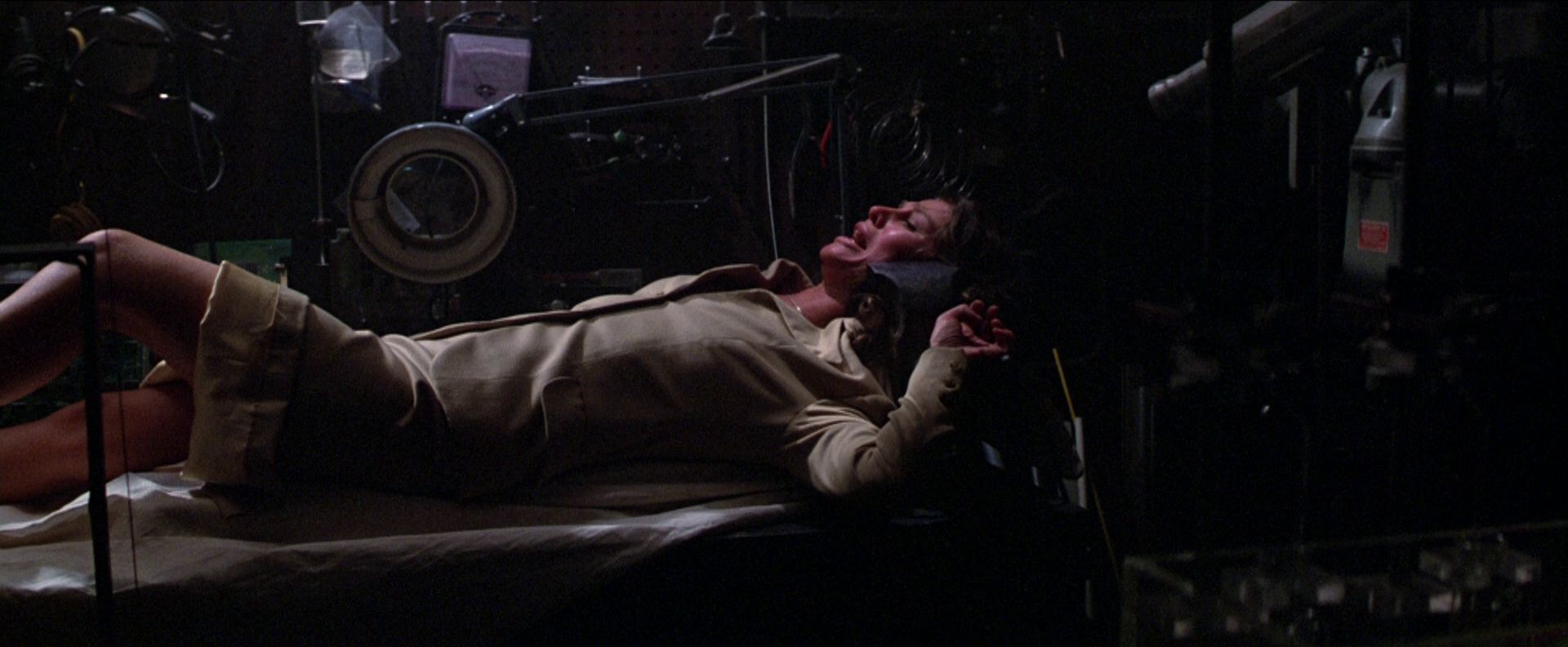
You know, I just wrote up ALTERED STATES (1980) and went on an old coot rant on how they don’t seem to make this kind of adult-oriented, hard-hitting, draw your own conclusions, R-rated sci-fi films anymore. And then realized one, they really don’t. And two, omigod, I’m old enough to go on an old coot rant now.